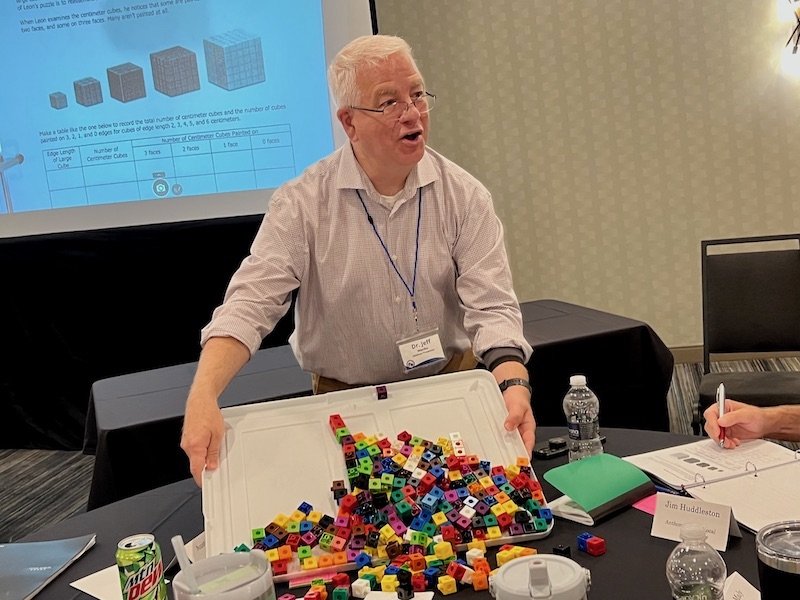Rejuvenating Math Teachers
“Dr. Wanko was phenomenal. So easily modeling his topic. The content was valuable. The time flew by. It was just the right balance of instruction, collaboration, and reflection — with a touch of humor.”
- Participant, Jennings Mathematics Institute
“I wonder…I wonder…I wonder…” Dr. Jeff Wanko repeats that phrase as he asks teachers to “Notice” and “Wonder” while they complete a series of activities during the first of two 2023 Mathematics Institutes held this summer in Cleveland for teachers from across the state.
“I like this kind of conversation, it leads to something very interesting,” says Dr. Wanko, as the teachers explored pentomino shapes and patterns while working with manipulatives and collaborating with colleagues.
“Dr. Wanko modeled excellently how to promote rich conversations and deep thinking relating to our content and grade level standards,” commented one participant in an after-workshop evaluation. “He allowed us time to ‘notice’ and ‘wonder’ about math concepts before explaining them – which helps make us better students/participants,” added another.
Each summer, the Jennings Foundation holds two separate Mathematics Institutes– one for teachers of grades 4 and 5 and another for teachers of grades 6-8 from schools throughout Ohio. Dr. Wanko, a Professor in the College of Education, Health and Society at Miami University, has led both sessions for the past 15 years.
“There are a lot of similarities in the workshop from one year to the next,” Dr. Wanko explains, “yet there are always some differences. What changes are some of the issues or challenges teachers are facing in schools. This could be new curricula their schools have adopted or new technology that the teachers need to think about and figure out how they are going to utilize in their classrooms.”
What Dr. Wanko has noticed over the past 15-20 years is the amazing growth teachers exhibit today. “I have seen big changes in teachers because of the environment they are in. And I mean very positive changes. Teachers are better prepared to work with their students and they have great ideas.
“At Miami, my work is mostly with preservice teachers, so it is great to get to meet teachers in the summer who are interested in learning new things,” he continues. “Every year, I walk away having learned many new things from them—like implementation strategies, technology applications, and what’s it’s like today in our schools.”
Applying What They’ve Learned
“A lot of our students struggle with the higher-level thinking and anything to get them more engaged in activities is beneficial,” says Leigh Ann O’Bryant, a 4th grade teacher at Rock Hill Elementary School in Ironton, when asked what she has learned in the workshop sessions. “Some workshops I’ve been to give you ideas that are almost impossible to implement. But these are very real activities I can easily add into the curriculum. I like to call them “anchor activities.’”
A 30-year veteran educator, Jennifer Detmar, who teaches a third-grade enrichment math class in North Ridgeville, says the Institute deepened her understanding of how students need to start with a concrete representation of something when learning new math concepts. “For a long time I have really believed that students need hands-on, and it frustrates me to see manipulatives sitting unpacked in the corner of a classroom.” Also the gifted specialist for her district, Ms. Detmar plans to offer professional development sessions for teachers in North Ridgeville incorporating concepts from the Institute when school resumes in the fall.
“Teachers typically voice concerns that they don’t have enough time to do everything they want and need to do,” explains Dr. Wanko. “They recognize that they need to be doing more constructivist learning in their classrooms, and I try to help them see how they can accomplish that within the frameworks of everything else that is being asked of them.
“I think that teachers need to recognize that they are not the sole providers of mathematical concepts and knowledge in their classrooms—that their students have lots of important ideas and the capacity for critical contributions,” he adds. “When teachers move from being the ‘sage on the stage’ to being a ‘guide on the side,’ they empower their students to be stronger mathematics learners and decision makers.
Kyle Cohen, a 4th grade teacher from Nordonia Hills says he really appreciated the opportunity to attend a professional development program focused solely on math. “I gained tools and resources I can implement immediately into my classroom,” he remarks. “It’s also been great connecting with other educators who teach math.”
Dr. Wanko says that each year he hopes teachers make connections at the institutes that last well beyond the two days they spend together during the summer.
Comments from Teachers About the
Math Institutes:
“Dr Wanko modeled excellently how to promote rich conversations and deep thinking relating to our content and grade level standards. I took away a wealth of knowledge to take back to my classroom and my colleagues.” – 4th&5th grade Institute
“Dr. Wanko brought mathematical concepts to the forefront – reminding us that his is HOW we teach content standards. He emphasized the importance of developing concepts and conceptual understanding.” – 4th&5th grade Institute
“Dr. Wanko’s ability to ask critical questions that forced us to think more critically is an excellent example of how to do this with our students.” – 4th&5th grade Institute
“Dr. Wanko helped provide more ‘sense’ to the struggles our students face.” – 6th-8th grade Institute
“The best seminar I’ve been to in the 10 + years. I love that open-ended questions are used often to lead to higher level thinking/reasoning.” – 6th-8th grade Institute






